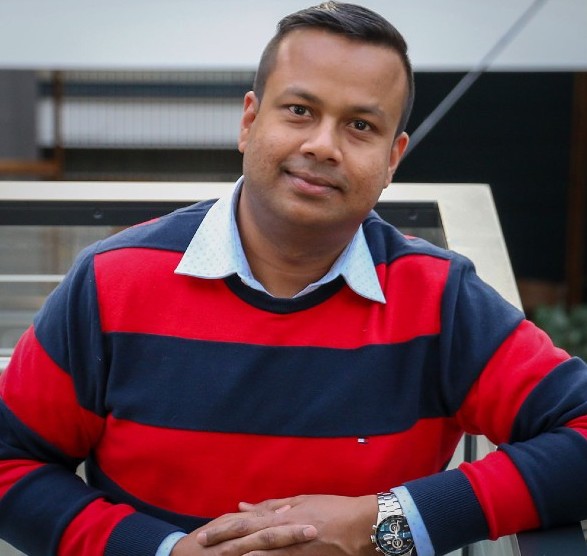NCMM Appoints New Group Leader for Precision Medicine
NCMM is delighted to announce that Dr Biswajyoti Sahu has been recruited as a new group leader for Precision Medicine. Dr Sahu will join us in September 2022 from the University of Helsinki, Finland.

Note: This article orginallly appeared on the NCMM website https://www.med.uio.no/ncmm/english/news-and-events/news/2022/NCMM-Appoints-New-Group-Leader-For-Precision-Medicine
Dr Sahu is a molecular biologist by training with expertise in functional cancer epigenomics using genome-wide multi-omics approach to study transcription factors in malignant gene regulation. Dr Sahu received his PhD from the University of Helsinki on androgen-receptor signalling in prostate cancer, followed by a postdoctoral training with Jussi Taipale at University of Helsinki and University of Cambridge taking a systems biology approach to study cellular transformation and human gene regulatory elements. Since 2019, Dr Sahu has led his independent Enhancer Biology group as a Principal Investigator in the Applied Tumor Genomics program of the Faculty of Medicine at the University of Helsinki, studying transcription factors and reprogramming of the non-coding regulatory genome in human cancers.
In this article, Dr Sahu discusses his research on the molecular mechanisms of cancer and modulation of gene expression by combinatorial action of transcription factors, employing novel methods to understand the epigenetic features associated with cancer genesis and progression, and what his hopes and plans are for his time at NCMM.
What is the main focus of your research?
Main focus of my research is to understand epigenome reprogramming in human cancers and to define the precise role of cellular lineage in tumorigenesis. Transcription factors control cell identity by regulating gene expression, and aberrant gene regulation and epigenetic reprogramming is a hallmark of human cancers. In my research, I use cutting-edge functional genomics methods to study innovative cellular model systems and patient tumor samples. My goal is to reveal molecular mechanisms operating at the epigenetic level that promote development of human cancer, aiming for translational impact on precision medicine.
What first drew you to this topic(s)?
Transcription factors have always fascinated me from my early sojourn in science. During my PhD training, I was at the cusp of an interesting era where the advent of next generation sequencing (NSG) completely altered the course of modern genomics research, and I adapted these methods early on to study specialized transcription factors like steroid hormone receptors and pioneer transcription factors in prostate cancer. Using NGS methods, I was able to have an unbiased genome-wide view of our regulatory genome, and it was this excitement of looking where and how these transcription factors find and bind DNA to control gene expression, that really drew me to this topic. Thus, the natural transition was to understand more profoundly the central role of transcription factors in gene regulation and human cancers.
What motivates you most about your research?
The constant vigour to understand, interpret and solve complex biological problems motivates me the most. It is exciting to be able to advance our knowledge of cellular mechanisms at the molecular level in human cells. My high-impact findings such as paradigm shift discovery about the role of pioneer factor FOXA1 in prostate cancer, establishment of a molecularly defined novel approach to study human cancer and revealing the sequence determinants of human gene regulatory elements are a testament to that and fuel my engine of motivation. Working and collaborating with talented researchers and colleagues with diverse expertise is a rewarding aspect of scientific work. Moreover, adapting and developing new technologies is a constant source of motivation for me, not only in functional genomics but also using the cutting-edge tools such as CRISPR-Cas9 for genome-editing, and molecular assays from single-cell and single-molecule resolution to high-throughput measurements together with their integrative computational analyses.
How do you feel about becoming a group leader and what do you hope to achieve in the first 5 year period?
Being a group leader allows me to expand and propagate my ideas in understanding the molecular mechanisms of our regulatory genome. It also gives me the opportunity to take the tradition of teaching and learning forward by training young researchers in high-quality research for continuation of science. I hope that within the first five years, I am able to make new discoveries with translational impact about the role transcription factors have in human cancers, using my integrative functional genomics approach from in vivo cellular models to patient materials. The goal is also to develop new methods and tools that can be useful for the wider research community.
What advice would you give to young researchers starting out in their career?
Doing high-quality science needs not only talent but also focus and dedication. For young researchers, my advice is to be motivated enough to work with strong determination and to have resilience and perseverance to tackle challenging questions. The scientific problems we are addressing have no ready-made answers, so it is essential to have child-like curiosity and keep experimenting until we find the most logical explanation to our research questions. I feel that doing scientific research is unlike any other job and tests the best out of all of us!
What most attracted you to NCMM and Norway, and what are you most looking forward to about being based in Oslo?
I have got the opportunity to do top-quality research in the neighbouring Nordic country, Finland, for close to two decades starting from my PhD studies. Thus, I am happy to move to Norway, another well-functioning Nordic country with two main attractions: NCMM as an EMBL partner institute in Molecular Medicine and the vibrant cancer research community at the University of Oslo. I am looking forward to working in this stimulating environment, and feel that I have a lot to contribute from my research training and expertise, for advancing the field of cancer research at NCMM and the University of Oslo in close collaboration with the scientific community here.